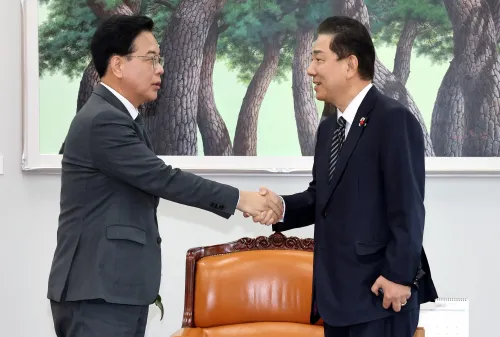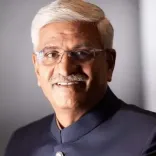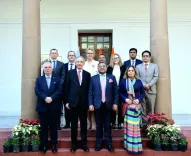How is Maha CM Advocating for Human Resource Development in AI, Quantum Computing, and Semiconductors?
Synopsis
Key Takeaways
- Maharashtra leads in data center capacity with 60% share in India.
- Focus on human resource development in AI, quantum computing, and semiconductors.
- MKCL plays a crucial role in democratizing technology knowledge.
- State government supports initiatives aimed at fostering innovation.
- Emphasis on inclusivity in technology education and access.
Pune, Aug 20 (NationPress) Chief Minister Devendra Fadnavis emphasized that even though Maharashtra holds the title of the data center capital of India, housing 60% of the nation's data center capacity, there is an urgent requirement to nurture skilled human resources in quantum computing, artificial intelligence, and semiconductors to effectively confront the challenges posed by AI.
In his speech during the silver jubilee celebration of the Maharashtra Knowledge Corporation Limited (MKCL), the Chief Minister highlighted the necessity of disseminating knowledge about AI to every individual, especially considering that data has emerged as a crucial element of global wealth.
He stressed the importance of progressing in this context by recognizing new values and challenges. “As we navigate the significant challenges associated with artificial intelligence, it becomes essential to make this knowledge accessible to all. With data now a vital asset, we must advance by identifying new opportunities and challenges. By developing competent human resources in quantum computing, AI, and semiconductors, we can ride the wave of innovation. Maharashtra, being the country's data center capital, should leverage these facilities, and the state government is committed to supporting all efforts,” stated the Chief Minister.
Additionally, he remarked that MKCL should cultivate a generation capable of adapting to the transformative changes brought about by the rapid evolution of artificial intelligence.
He assured that the state government would play a leading role in supporting MKCL's innovative and development-focused initiatives.
“Similar to the information technology revolution, we must remain ahead in the artificial intelligence era. As employment dynamics shift, creating a system to impart new knowledge and technology to the younger generation is imperative, and the government will back this effort. MKCL's various initiatives have proven beneficial for both society and the government. The newly launched MKCL website offers access to nearly 50,000 books. Through MKCL's diverse projects, transparency has been enhanced in administration, leading to increased efficiency,” the Chief Minister acknowledged, commending MKCL’s 24-year journey.
He mentioned that when the internet wave swept the world, MKCL proactively sought solutions to the issues of digital inequality, establishing a framework to benefit all sections of society. MKCL's efforts were commendable, focusing on long-term societal benefits rather than mere profit.
“A network of 6,500 entrepreneurs has been developed in the state alongside a system that ensures access for every individual in society. We successfully integrated the common man into this framework,” he added, praising MKCL's contributions.
Deputy Chief Minister Ajit Pawar noted that MKCL began with computer literacy, reaching millions of students with computer technology, and has worked to introduce new technologies to rural areas in the digital era.
“As artificial intelligence drives rapid changes across various sectors globally, it is our collective responsibility to empower the youth for this evolving technological landscape,” he emphasized.
Pawar, also serving as the finance and planning minister, assured that sufficient funds would be allocated for establishing a technology research institute by MKCL and the Information Technology Department.
Minister of Information Technology Ashish Shelar acknowledged that MKCL has trained two crore trainees in information technology, emphasizing the necessity of technological tools alongside the Marathi language as we advance and promote digital literacy.










